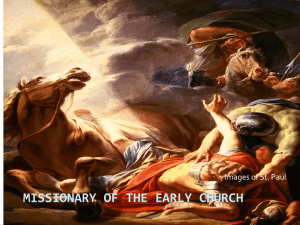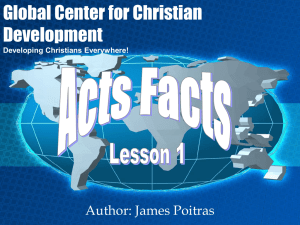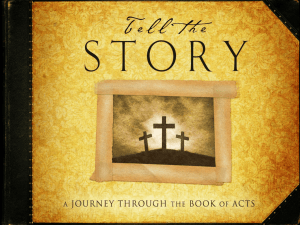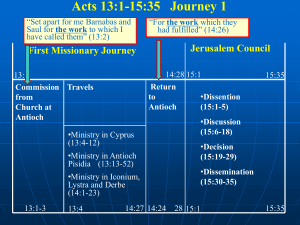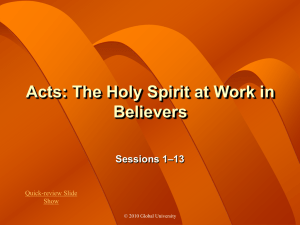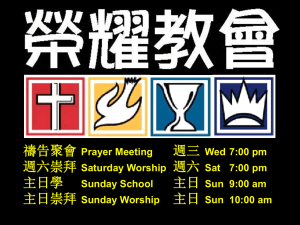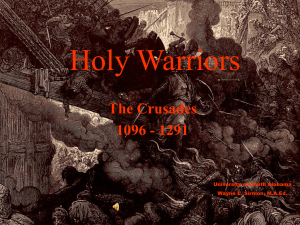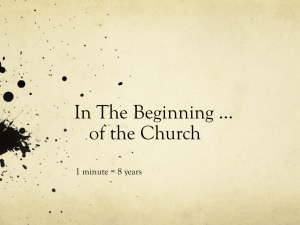Acts of the Apostles
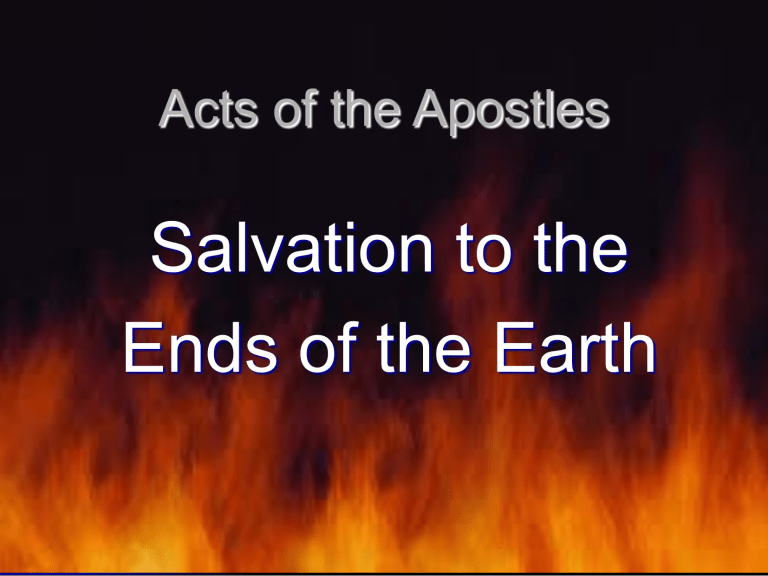
Acts of the Apostles
Salvation to the
Ends of the Earth
Acts of the Apostles
Second Volume of Luke-Acts
Compare Luke 1:1-4 and Acts 1:1-2
Author was Luke, a companion of Paul
Early church accepted author was Luke
“We” passages
Acts of Holy Spirit or Acts of Jesus
Mission “to the ends of the earth”
Why was the mission of the early church so successful?
History and Theology Combined
Significance of Acts for today
Date and Location
Written between AD 62 and 64
Before Peter and Paul martyred.
Paul had been imprisoned in Rome for two years
Right up to date
If written after AD 66, why are deaths of apostles omitted?
Historical accuracy of Luke surprising if written later
Location of writing – Uncertain (Rome?)
Chronology of Main Events in
Acts
29 AD – Ascension and Pentecost
35 AD – Martyrdom of Stephen
37 AD – Paul’s Conversion
38 AD – Peter and Cornelius
39 AD Paul in Tarsus
40 AD Paul’s first visit to Jerusalem
43 AD Barnabas in Antioch
45 AD Paul’s First Missionary Journey
Chronology of Acts (cont)
51 AD – Council of Jerusalem
52 AD – Paul’s Second Missionary Journey
53 AD – Letters to Thessalonians
58 AD – Paul arrested in Jerusalem.
Imprisonned in Caesarea
59 AD – Paul’s journey to Rome
60 AD Paul in Rome
62 AD – End of Acts
Structure of Acts
Major Sections
Beginnings of the Church (1-2)
The Church in Jerusalem (3-5)
Expansion (6-9:31)
Beginning of Gentile Mission (9:32-12)
Missionary Journeys (13-20)
Paul’s Arrest and Imprisonment (21-28)
A fulfilment of Acts 1:8?
Transition Points?
Cultural Background
Interest in Judaism
Unworthy gods
Philosophy tended to be religion-free
Moral rigour of Judaism
Diaspora
But ethnic & required circumcision
God-fearers
From root of Judaism
But negative aspects – Speech of Stephen.
Purpose
To tell us what happened next – a historical account as a legacy to the church
Addressed to Theophilus “lover of God”
Acts 1:1-2; Luke 1:1-4
Author not an eye-witness
Writing to a rich patron?
PR/spin/Propaganda?!
Christianity’s founder had been crucified
Its main spokesman was under house arrest
It seemed to cause disturbance wherever it spread
Purpose (cont)
Genre of Acts exists in ancient world
Refutation of Heresy (unlikely)
Luke portrays Christianity as a Credible
Religion (ie political apologetic)
Luke 23:13 Miscarriage of justice
Appeal to Caesar, cf Nelson Mandela
Instigators of riots – Religious Jews, tradespeople
To show how the church, composed of
Jews and Gentiles, stands in continuity with Judaism
Luke's Concerns
Continuity of God’s purposes
The Holy Spirit
The mission and message of the church
The Role of Prayer in church life
Jesus' concern for poor and women
Christianity as a Universal Faith – Inclusion of the Gentiles
Christianity as a Lawful Religion
Jesus as Saviour
Key Themes
Jesus – the fulfilment of Israel
The Church as the new People of God
Life and Structure of the new Community
The Holy Spirit as agent of Renewal and
Mission
The Mission of God – Salvation to the ends of the earth
Reaching out across Religious and
Cultural Boundaries
The Speeches in Acts
About 30% of Acts consists of Speeches. Can we tell what the early Christians preached?
Explanations – Acts 2, 3
Fit into contexts
Jerusalem
Athens
Quotations from the OT (Acts 2)
Reference to culture/history
Quotations from secular writers (Acts 17:8)
Sermons in Acts
Peter
Acts 2:14-37; 3:12-26; 4:8-12; 10:34-43
Stephen
Acts 6
Paul
Acts 13:16-41, 46-47; 14:15-17; 17:2-3, 22-32
Testimonies
Acts 22:3-21; 24:10-21; 26:2-27, 29; 28:23-28
Kerygma – Acts Sermons
The Age of Fulfillment has dawned, the “latter days” foretold by the prophets.
This has taken place through the birth, life, ministry, death and resurrection of Jesus.
By virtue of the resurrection, Jesus has been exalted at the right hand of God as Messianic head of the new Israel.
The Holy Spirit in the church is the sign of
Christ's present power and glory.
The Messianic Age will reach its consummation in the return of Christ.
An appeal is made for repentance with the offer of forgiveness, the Holy Spirit, and salvation.
A Justification of Paul?
Peter and Paul compared
Healing
Vision
Release from Prison
Raising the dead
Bestowing the Spirit
Distinctive Teaching of Holy
Spirit
Begins in Acts 2
Ends with Holy Spirit Acts 28:25
Holy Spirit Empowering
Jerusalem, Samaria, Caesarea, Ephesus, Paul
True Israel – Inspired by Holy Spirit
Boldness of ordinary men
Power for service
World Mission
Single Pentecost?
Jerusalem, Samaria, Gentile
Subsequent experiences
Samaritan Pentecost
Acts 8. Philip
Peter's power of the keys – Lampe
Tied into Israel
Pentecost – birthday or coming of age of church?
A transition phase or a model of ministry for the
“last days”?
Missionary Methods
Fulfilling commission in Acts 1:8?
Breaking the mould
Catalysts for movement
Persecution and Holy Spirit
Focus on Cities, New Regions
Preaching & healing
Baptism and Laying on of hands
Methods of Proclamation
Churches in Acts
We encounter many different churches in
Acts.
Jerusalem
Damascus
Antioch
Corinth
Ephesus
Rome
Do they paint a uniform picture – or is there acceptable variation among churches?
Use of Old Testament Scripture
Acts 2 – Joel, Psalms
Acts 3 – Deuteronomy, Genesis
Acts 4 – Psalms
Acts 7 – Genesis, Exodus, Deuteronomy,
Amos, Isaiah
Acts 8 – Isaiah
Acts 13 – Psalms, Isaiah, Habakkuk
Acts 15 – Amos
Acts 23 - Exodus
Acts 28 - Isaiah
The Council of Jerusalem
Acts 15
The Issues
The nature of the church now that Gentiles were being included
Were they expected to obey the Laws of
Moses?
How is the church to relate to Judaism?
What does Acts 15:16-17 tell us about the relationship of the church to the OT expectations of Israel?
Christians in Acts
The term Christian first occurs in Acts 11:26
The brethren (23x)
Disciples (21x) – including a woman (9:36)
Saints (4x) – Acts 9:13, 32, 41; 26:10
The Church (19x); The Way (10x)
Those who believe (2:44 etc)
Those who call upon the name (9:14 etc)
Those who are being saved (2:47)
Those who received the word (2:41)
Community Life
Daily Distribution to widows
Care of the dead
Church in the home
Worship and fasting
Hymn singing
Hospitality
Financial giving
Late, late church
Ministry within the Early Church
Ministry Gifts
Apostles – Acts 1:2
Prophets – Acts 13:1
Teachers – Acts 13:1
Evangelists – Acts 21:9
Church Leadership
Elders – Acts 20:17
Deacons – Acts 6
How do such gifts inter-relate?
Significant Ministry Events in Acts
Matthias replaces Judas among the 12
Healing and Preaching
The Seven chosen to serve
Calling of Saul of Tarsus
Appointment of Elders
Council of Jerusalem
Prisca and Aquila teach Apollos
Paul and the Ephesian Elders
The Collection for poor saints in Jerusalem
Mission and Ministry
Theology of the Holy Spirit
Ordo Salutis
Signs and Wonders
Gospel Proclamation in diverse settings
Church growth & church planting
Missiology
Patterns of Christian Ministry
Fresh Expressions of Church
The Apostle Paul
Disciple of Gamaliel
Talmud
Grandson of Hillel
Native of Tarsus
Died in Rome under
Nero (~AD 66)
A Pharisee before his conversion (Phil
3:5)
Missionary extraordinary
Great letter writer
Paul the Missionary
Planned to visit
Spain (Rom 15:24)
Worked in a team –
Col 4:10-14,
Philemon
Focussed on cities
Trained the next generation –
Timothy, Titus
Anthony Thistleton sees
Corinth as a “post-modern” city. Paul experienced similar challenges to the ones we face.
Locations
Philippi
Jerusalem
Caesarea
Rome
Responses
Prayer
Letters
Delegation
Paul in Prison
Acts in the Church Today
A model for church ministry
Only for overseas mission
A heritage document
Irrelevant

